University Nursing Assignment: Health Policy, Ethics and Immunization
VerifiedAdded on 2022/10/06
|5
|1222
|236
Homework Assignment
AI Summary
This nursing assignment addresses three key areas: the methods nurses use to influence health policies and legislation, the controversy surrounding childhood immunization and its impact on community health, and a case study involving a chief nursing officer's ethical dilemma regarding a potential conflict of interest. The assignment requires students to analyze the role of nurses in policy-making, discuss the scientific evidence and public debate surrounding childhood vaccinations, and apply ethical frameworks to resolve conflicts of interest in healthcare settings. The student provides detailed answers to all the questions with supporting references.
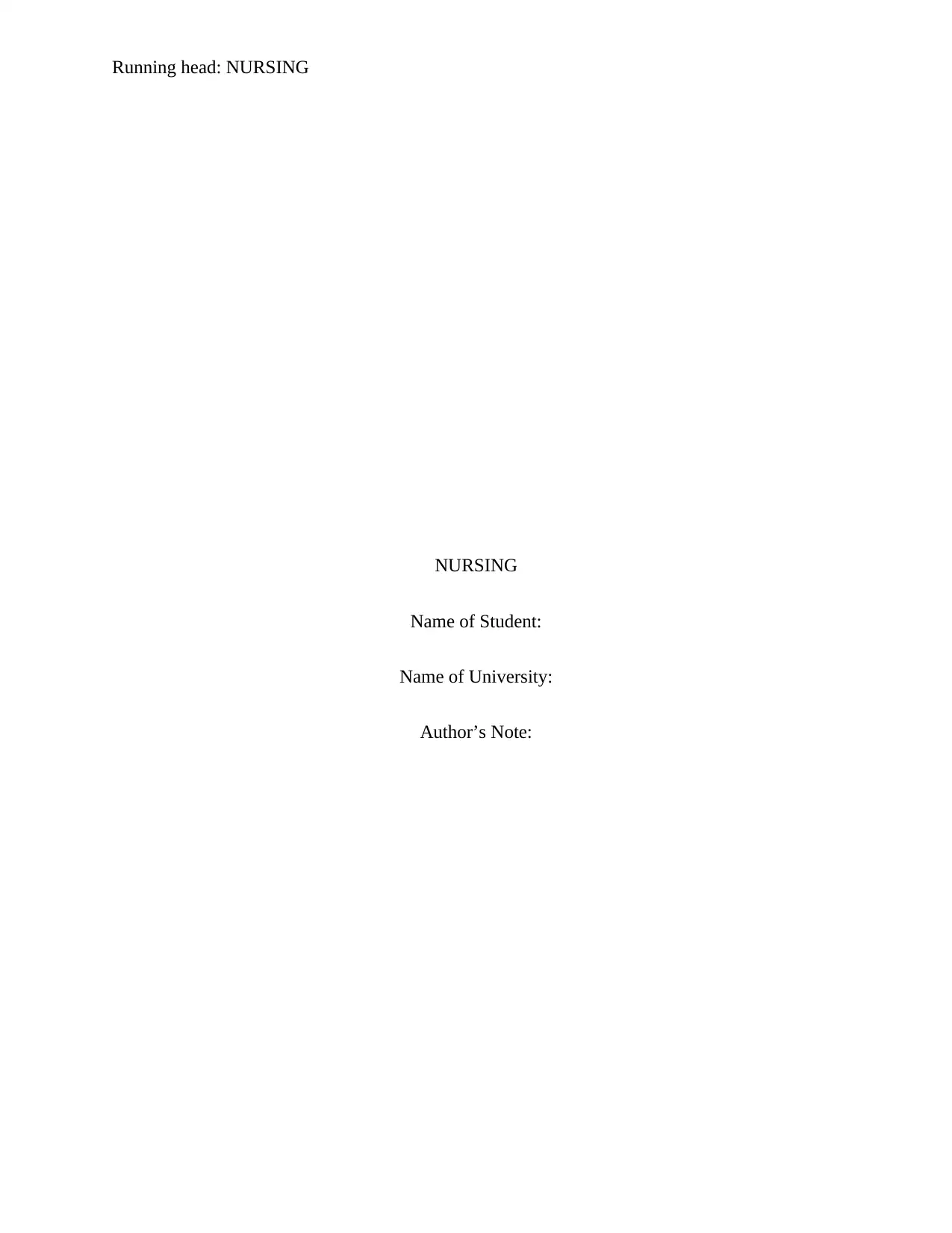
Running head: NURSING
NURSING
Name of Student:
Name of University:
Author’s Note:
NURSING
Name of Student:
Name of University:
Author’s Note:
Paraphrase This Document
Need a fresh take? Get an instant paraphrase of this document with our AI Paraphraser
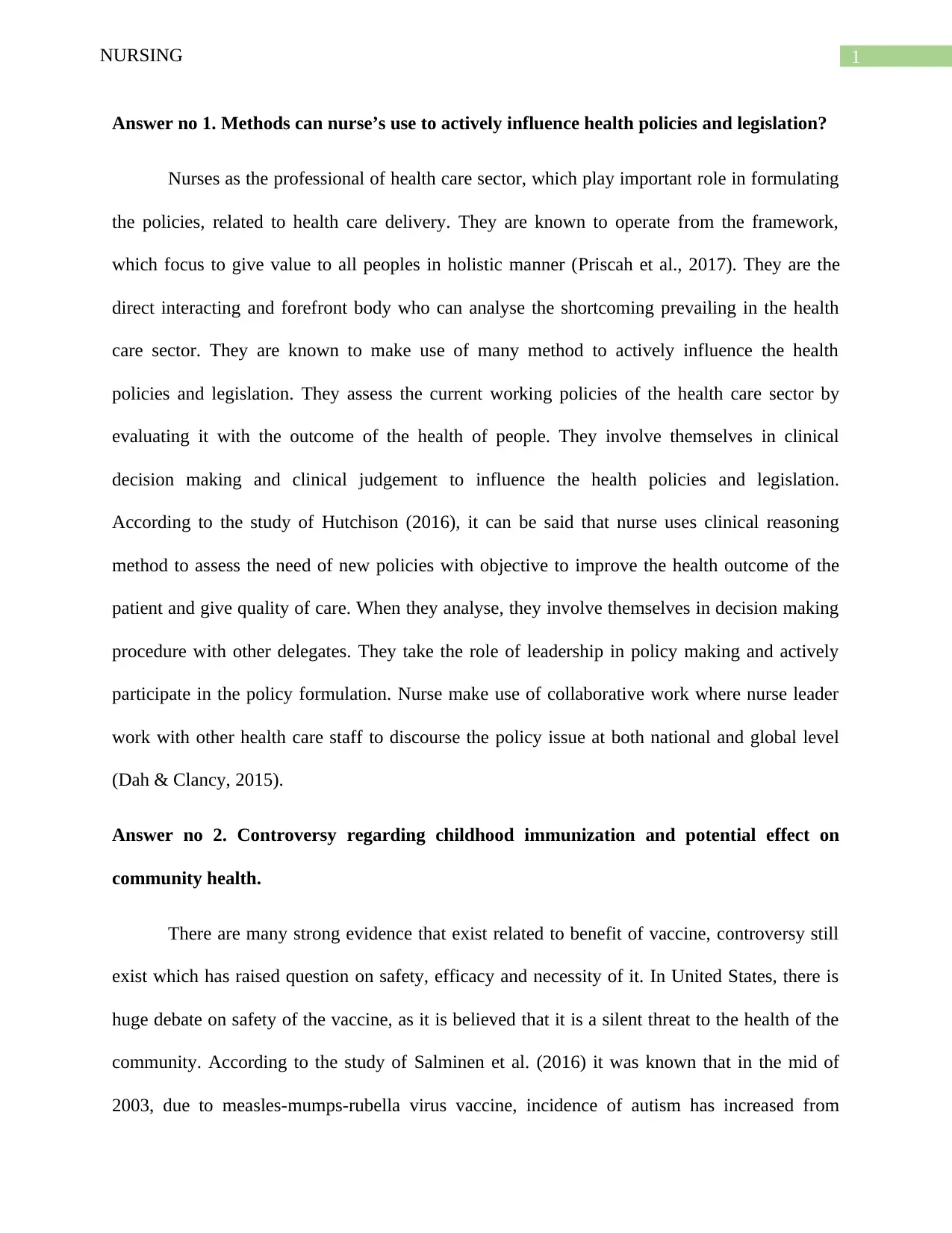
1NURSING
Answer no 1. Methods can nurse’s use to actively influence health policies and legislation?
Nurses as the professional of health care sector, which play important role in formulating
the policies, related to health care delivery. They are known to operate from the framework,
which focus to give value to all peoples in holistic manner (Priscah et al., 2017). They are the
direct interacting and forefront body who can analyse the shortcoming prevailing in the health
care sector. They are known to make use of many method to actively influence the health
policies and legislation. They assess the current working policies of the health care sector by
evaluating it with the outcome of the health of people. They involve themselves in clinical
decision making and clinical judgement to influence the health policies and legislation.
According to the study of Hutchison (2016), it can be said that nurse uses clinical reasoning
method to assess the need of new policies with objective to improve the health outcome of the
patient and give quality of care. When they analyse, they involve themselves in decision making
procedure with other delegates. They take the role of leadership in policy making and actively
participate in the policy formulation. Nurse make use of collaborative work where nurse leader
work with other health care staff to discourse the policy issue at both national and global level
(Dah & Clancy, 2015).
Answer no 2. Controversy regarding childhood immunization and potential effect on
community health.
There are many strong evidence that exist related to benefit of vaccine, controversy still
exist which has raised question on safety, efficacy and necessity of it. In United States, there is
huge debate on safety of the vaccine, as it is believed that it is a silent threat to the health of the
community. According to the study of Salminen et al. (2016) it was known that in the mid of
2003, due to measles-mumps-rubella virus vaccine, incidence of autism has increased from
Answer no 1. Methods can nurse’s use to actively influence health policies and legislation?
Nurses as the professional of health care sector, which play important role in formulating
the policies, related to health care delivery. They are known to operate from the framework,
which focus to give value to all peoples in holistic manner (Priscah et al., 2017). They are the
direct interacting and forefront body who can analyse the shortcoming prevailing in the health
care sector. They are known to make use of many method to actively influence the health
policies and legislation. They assess the current working policies of the health care sector by
evaluating it with the outcome of the health of people. They involve themselves in clinical
decision making and clinical judgement to influence the health policies and legislation.
According to the study of Hutchison (2016), it can be said that nurse uses clinical reasoning
method to assess the need of new policies with objective to improve the health outcome of the
patient and give quality of care. When they analyse, they involve themselves in decision making
procedure with other delegates. They take the role of leadership in policy making and actively
participate in the policy formulation. Nurse make use of collaborative work where nurse leader
work with other health care staff to discourse the policy issue at both national and global level
(Dah & Clancy, 2015).
Answer no 2. Controversy regarding childhood immunization and potential effect on
community health.
There are many strong evidence that exist related to benefit of vaccine, controversy still
exist which has raised question on safety, efficacy and necessity of it. In United States, there is
huge debate on safety of the vaccine, as it is believed that it is a silent threat to the health of the
community. According to the study of Salminen et al. (2016) it was known that in the mid of
2003, due to measles-mumps-rubella virus vaccine, incidence of autism has increased from
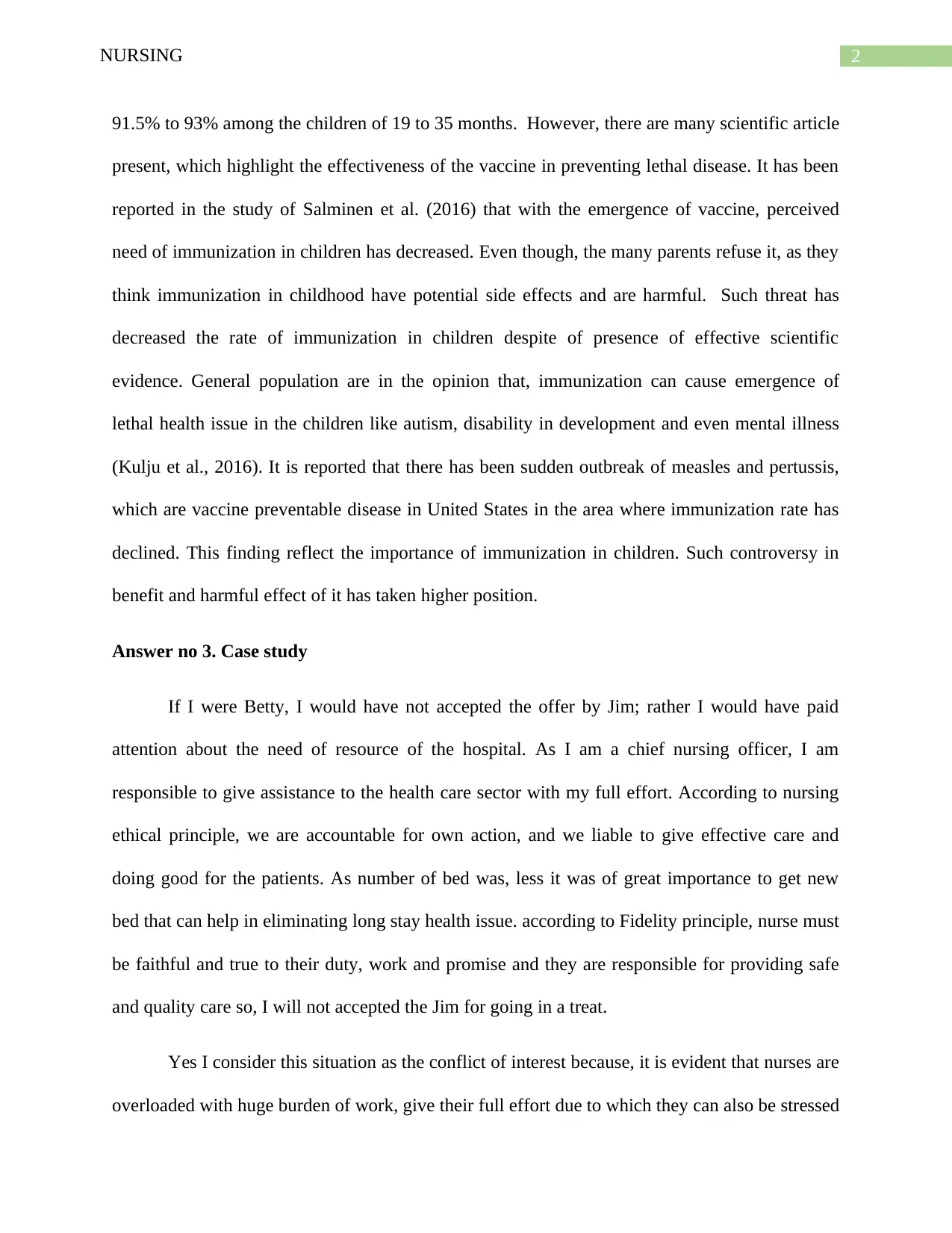
2NURSING
91.5% to 93% among the children of 19 to 35 months. However, there are many scientific article
present, which highlight the effectiveness of the vaccine in preventing lethal disease. It has been
reported in the study of Salminen et al. (2016) that with the emergence of vaccine, perceived
need of immunization in children has decreased. Even though, the many parents refuse it, as they
think immunization in childhood have potential side effects and are harmful. Such threat has
decreased the rate of immunization in children despite of presence of effective scientific
evidence. General population are in the opinion that, immunization can cause emergence of
lethal health issue in the children like autism, disability in development and even mental illness
(Kulju et al., 2016). It is reported that there has been sudden outbreak of measles and pertussis,
which are vaccine preventable disease in United States in the area where immunization rate has
declined. This finding reflect the importance of immunization in children. Such controversy in
benefit and harmful effect of it has taken higher position.
Answer no 3. Case study
If I were Betty, I would have not accepted the offer by Jim; rather I would have paid
attention about the need of resource of the hospital. As I am a chief nursing officer, I am
responsible to give assistance to the health care sector with my full effort. According to nursing
ethical principle, we are accountable for own action, and we liable to give effective care and
doing good for the patients. As number of bed was, less it was of great importance to get new
bed that can help in eliminating long stay health issue. according to Fidelity principle, nurse must
be faithful and true to their duty, work and promise and they are responsible for providing safe
and quality care so, I will not accepted the Jim for going in a treat.
Yes I consider this situation as the conflict of interest because, it is evident that nurses are
overloaded with huge burden of work, give their full effort due to which they can also be stressed
91.5% to 93% among the children of 19 to 35 months. However, there are many scientific article
present, which highlight the effectiveness of the vaccine in preventing lethal disease. It has been
reported in the study of Salminen et al. (2016) that with the emergence of vaccine, perceived
need of immunization in children has decreased. Even though, the many parents refuse it, as they
think immunization in childhood have potential side effects and are harmful. Such threat has
decreased the rate of immunization in children despite of presence of effective scientific
evidence. General population are in the opinion that, immunization can cause emergence of
lethal health issue in the children like autism, disability in development and even mental illness
(Kulju et al., 2016). It is reported that there has been sudden outbreak of measles and pertussis,
which are vaccine preventable disease in United States in the area where immunization rate has
declined. This finding reflect the importance of immunization in children. Such controversy in
benefit and harmful effect of it has taken higher position.
Answer no 3. Case study
If I were Betty, I would have not accepted the offer by Jim; rather I would have paid
attention about the need of resource of the hospital. As I am a chief nursing officer, I am
responsible to give assistance to the health care sector with my full effort. According to nursing
ethical principle, we are accountable for own action, and we liable to give effective care and
doing good for the patients. As number of bed was, less it was of great importance to get new
bed that can help in eliminating long stay health issue. according to Fidelity principle, nurse must
be faithful and true to their duty, work and promise and they are responsible for providing safe
and quality care so, I will not accepted the Jim for going in a treat.
Yes I consider this situation as the conflict of interest because, it is evident that nurses are
overloaded with huge burden of work, give their full effort due to which they can also be stressed
⊘ This is a preview!⊘
Do you want full access?
Subscribe today to unlock all pages.

Trusted by 1+ million students worldwide
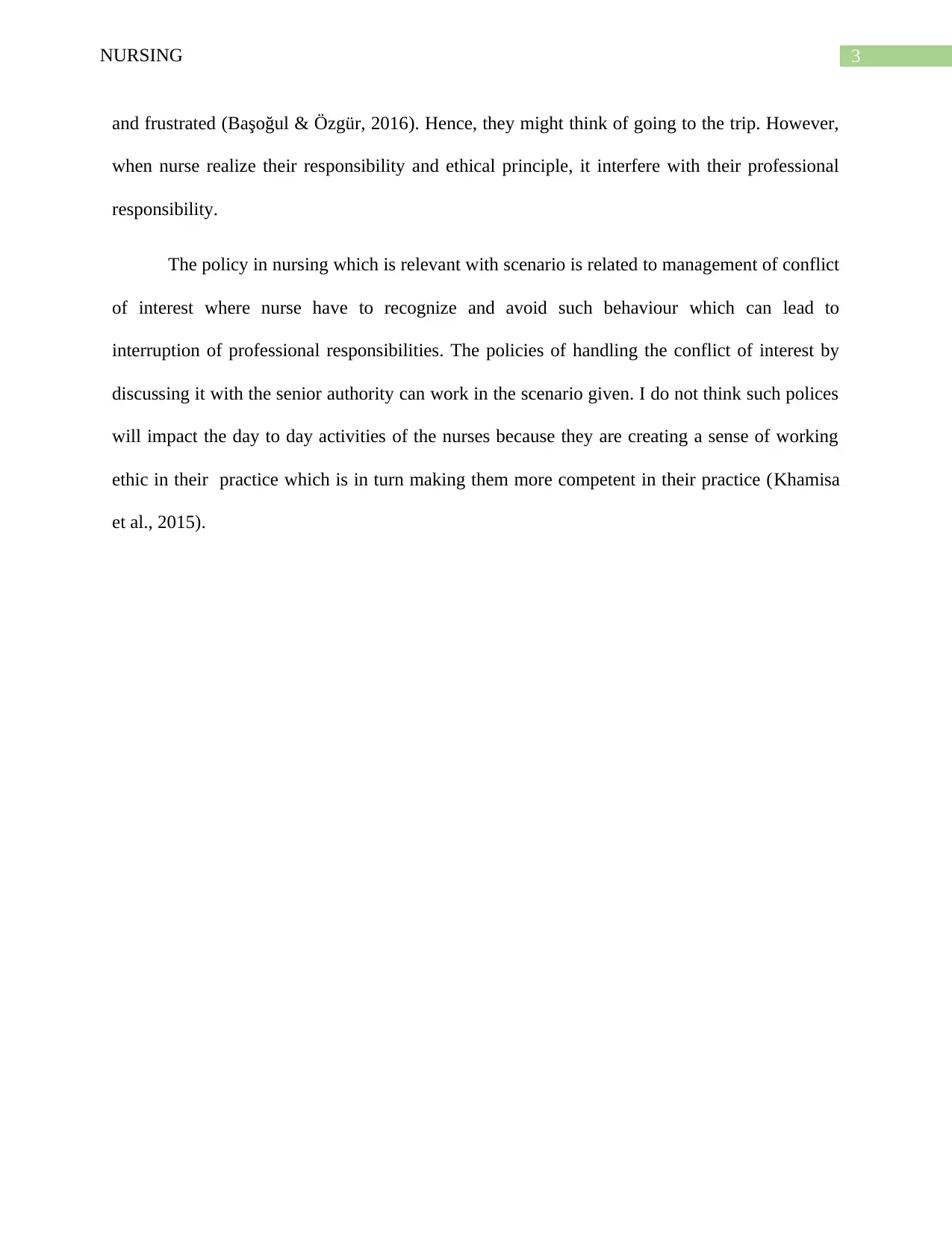
3NURSING
and frustrated (Başoğul & Özgür, 2016). Hence, they might think of going to the trip. However,
when nurse realize their responsibility and ethical principle, it interfere with their professional
responsibility.
The policy in nursing which is relevant with scenario is related to management of conflict
of interest where nurse have to recognize and avoid such behaviour which can lead to
interruption of professional responsibilities. The policies of handling the conflict of interest by
discussing it with the senior authority can work in the scenario given. I do not think such polices
will impact the day to day activities of the nurses because they are creating a sense of working
ethic in their practice which is in turn making them more competent in their practice (Khamisa
et al., 2015).
and frustrated (Başoğul & Özgür, 2016). Hence, they might think of going to the trip. However,
when nurse realize their responsibility and ethical principle, it interfere with their professional
responsibility.
The policy in nursing which is relevant with scenario is related to management of conflict
of interest where nurse have to recognize and avoid such behaviour which can lead to
interruption of professional responsibilities. The policies of handling the conflict of interest by
discussing it with the senior authority can work in the scenario given. I do not think such polices
will impact the day to day activities of the nurses because they are creating a sense of working
ethic in their practice which is in turn making them more competent in their practice (Khamisa
et al., 2015).
Paraphrase This Document
Need a fresh take? Get an instant paraphrase of this document with our AI Paraphraser
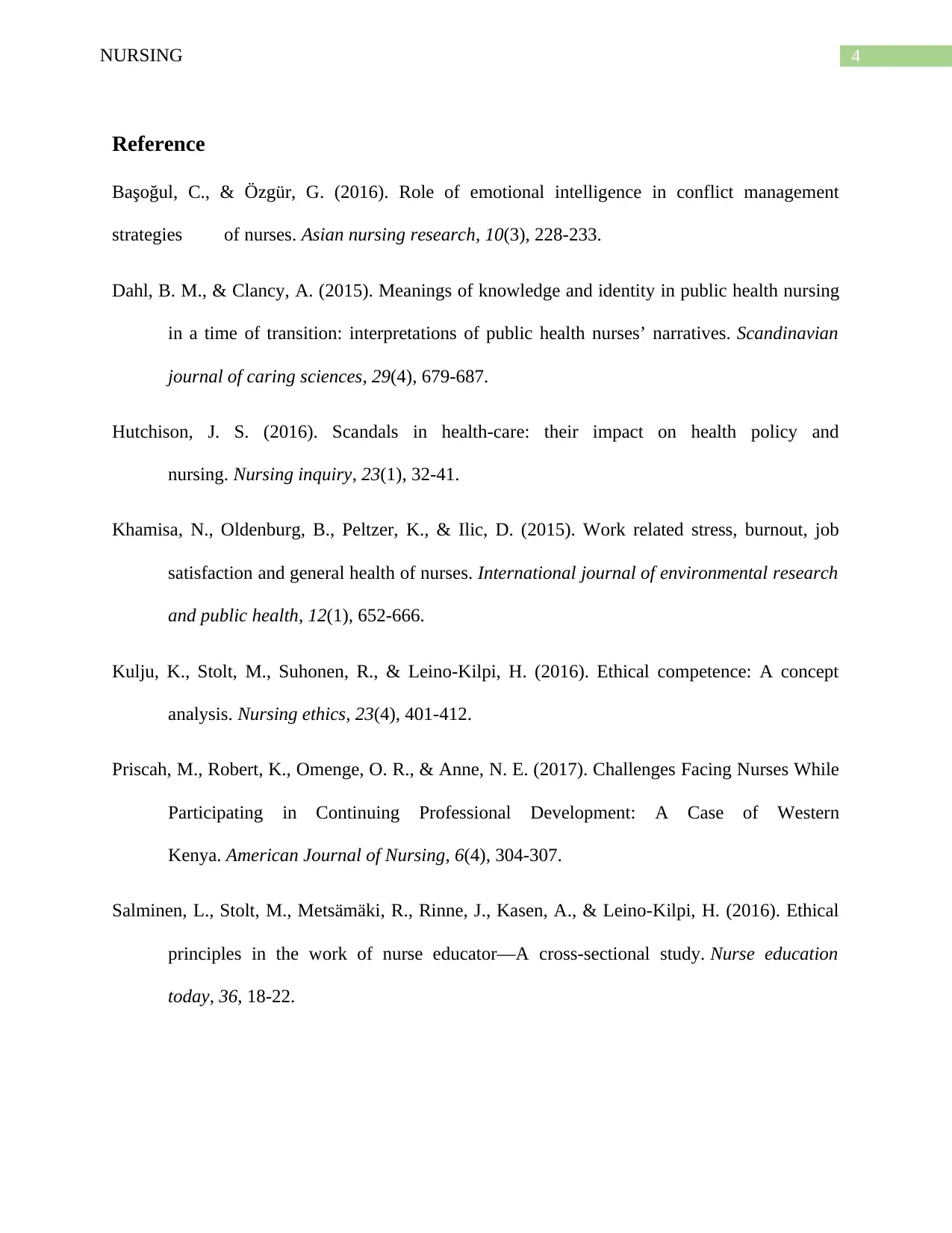
4NURSING
Reference
Başoğul, C., & Özgür, G. (2016). Role of emotional intelligence in conflict management
strategies of nurses. Asian nursing research, 10(3), 228-233.
Dahl, B. M., & Clancy, A. (2015). Meanings of knowledge and identity in public health nursing
in a time of transition: interpretations of public health nurses’ narratives. Scandinavian
journal of caring sciences, 29(4), 679-687.
Hutchison, J. S. (2016). Scandals in health‐care: their impact on health policy and
nursing. Nursing inquiry, 23(1), 32-41.
Khamisa, N., Oldenburg, B., Peltzer, K., & Ilic, D. (2015). Work related stress, burnout, job
satisfaction and general health of nurses. International journal of environmental research
and public health, 12(1), 652-666.
Kulju, K., Stolt, M., Suhonen, R., & Leino-Kilpi, H. (2016). Ethical competence: A concept
analysis. Nursing ethics, 23(4), 401-412.
Priscah, M., Robert, K., Omenge, O. R., & Anne, N. E. (2017). Challenges Facing Nurses While
Participating in Continuing Professional Development: A Case of Western
Kenya. American Journal of Nursing, 6(4), 304-307.
Salminen, L., Stolt, M., Metsämäki, R., Rinne, J., Kasen, A., & Leino-Kilpi, H. (2016). Ethical
principles in the work of nurse educator—A cross-sectional study. Nurse education
today, 36, 18-22.
Reference
Başoğul, C., & Özgür, G. (2016). Role of emotional intelligence in conflict management
strategies of nurses. Asian nursing research, 10(3), 228-233.
Dahl, B. M., & Clancy, A. (2015). Meanings of knowledge and identity in public health nursing
in a time of transition: interpretations of public health nurses’ narratives. Scandinavian
journal of caring sciences, 29(4), 679-687.
Hutchison, J. S. (2016). Scandals in health‐care: their impact on health policy and
nursing. Nursing inquiry, 23(1), 32-41.
Khamisa, N., Oldenburg, B., Peltzer, K., & Ilic, D. (2015). Work related stress, burnout, job
satisfaction and general health of nurses. International journal of environmental research
and public health, 12(1), 652-666.
Kulju, K., Stolt, M., Suhonen, R., & Leino-Kilpi, H. (2016). Ethical competence: A concept
analysis. Nursing ethics, 23(4), 401-412.
Priscah, M., Robert, K., Omenge, O. R., & Anne, N. E. (2017). Challenges Facing Nurses While
Participating in Continuing Professional Development: A Case of Western
Kenya. American Journal of Nursing, 6(4), 304-307.
Salminen, L., Stolt, M., Metsämäki, R., Rinne, J., Kasen, A., & Leino-Kilpi, H. (2016). Ethical
principles in the work of nurse educator—A cross-sectional study. Nurse education
today, 36, 18-22.
1 out of 5
Related Documents
Your All-in-One AI-Powered Toolkit for Academic Success.
+13062052269
info@desklib.com
Available 24*7 on WhatsApp / Email
![[object Object]](/_next/static/media/star-bottom.7253800d.svg)
Unlock your academic potential
Copyright © 2020–2026 A2Z Services. All Rights Reserved. Developed and managed by ZUCOL.





